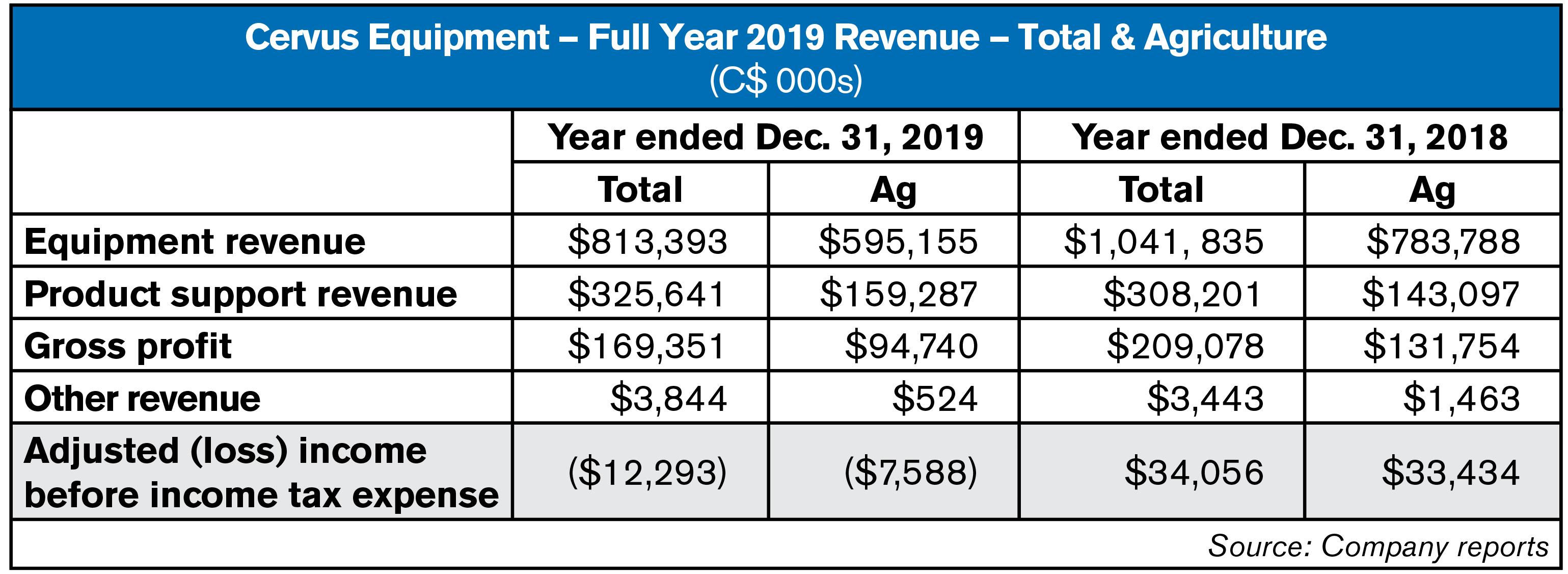Cervus Equipment, one of John Deere’s largest retailers of farm machinery in Canada, reported that 2019 revenue declined 16% for the full year, driven by a 22% decrease in equipment revenue, partly offset by a 6% increase in product support revenue.
Agriculture equipment revenue declined 24% for the year, as the Canadian agriculture industry faced a number of headwinds, including reduced 2018 farm income, increased input costs, reduced commodity prices and trade disputes, all compounded by poor growing and harvesting conditions in parts of western Canada.
The dealership group said, “Despite the headwinds shared across our Canadian equipment dealerships, product support revenue remained resilient, improving 6% for the year. The largest increase in product support revenue was in our agriculture segment, as demand for parts and service continued through the challenging harvest window. A difficult 2018 harvest also bolstered early season product support revenue in 2019.”

Cervus also reported that its agriculture segment used equipment inventory decreased $67 million or 37% as of Dec. 31, 2019 vs. June 30, 2019. Excess used equipment inventory in the agriculture industry resulted in inventory impairments of $10 million in the fourth quarter and $24 million for the year in 2019.
Gross profit declined 19%, or $40 million, for the year due to a decrease in both new and used equipment gross profit in the agriculture segment associated with lower revenues and margins. This $40 million decline includes an increase in equipment inventory impairments of $13 million for the year and the $16 million reduction in gross profit from agriculture new equipment sales in the second half of 2019.
Growth in product support revenue contributed an additional $7 million of gross profit for the year compared to 2018.
Fourth Quarter 2019 Results
For the fourth quarter of 2019, Cervus’ revenue decreased 14%, driven by a 20% decline in equipment revenue, partly offset by a 6% increase in product support revenue. This trend was consistent with the company’s annual results and impacted by the same factors.
Gross profit declined 29%, or $15 million, primarily comprised of an increase in equipment inventory impairments of $8 million and a $5 million reduction in gross profit from agriculture new equipment sales due to lower revenue, margins and incentives in the fourth quarter. Growth in product support revenue contributed an additional $1.5 million or 5% increase to gross profit in the quarter compared to 2018.
Management Comments
“2019 was a challenging year as our Western Canadian Agriculture operations navigated compounding and considerable headwinds,” said Angela Lekatsas, President and CEO of Cervus. “Amid these headwinds, agriculture equipment dealers faced excess supply of used equipment inventories resulting in our fourth quarter and full year inventory impairments of $10 million and $24 million respectively. Through focused actions taken to reduce our used agriculture inventory in the second half of 2019, we maintained our strong balance sheet, while achieving used inventory targets and limiting prolonged exposure to inventory carrying costs and valuation risk.
“With 2019 in our rear-view mirror, Cervus has turned its attention to executing on our 5 year strategy of achieving equilibrium between sales and product support with specific focus on our innovation and technology capabilities,” said Lekatsas. “In this regard, we are pleased to announce an exclusive partnership with Farm At Hand, part of the Telus family. This innovative farm management application enables the digitization of farm records to better manage farm activities, sales timing, field profits and equipment utilization, as well as integrating with the data and analytics delivered by John Deere Operations Center.
“We are also pleased to announce the opening of a new agriculture product support location in Nipawin, Saskatchewan. This new facility will complement the services currently being offered from our store in Melfort, enhancing the customer experience and improving service levels for farming operations in the agricultural areas of Nipawin, Carrot River, Choiceland and Aborfield,” Lekatsas said.





